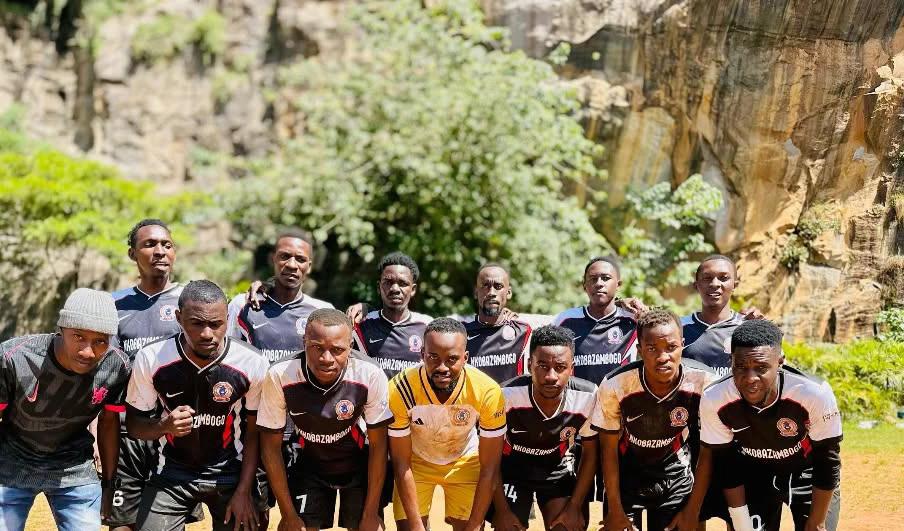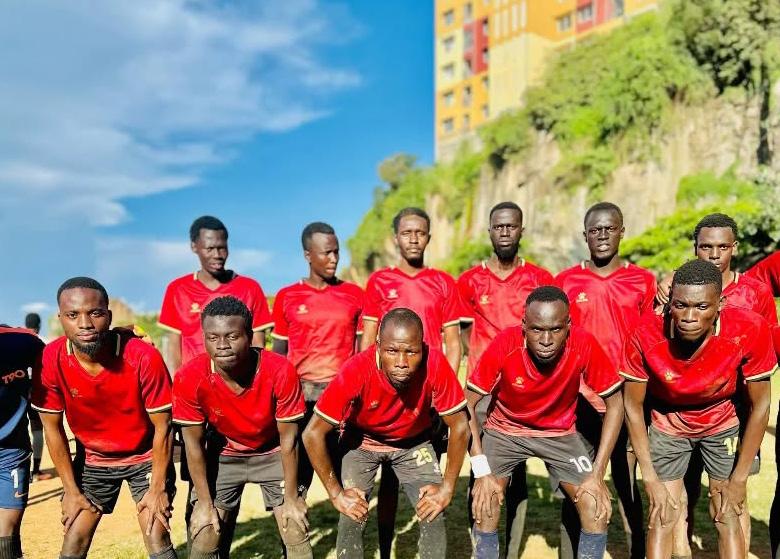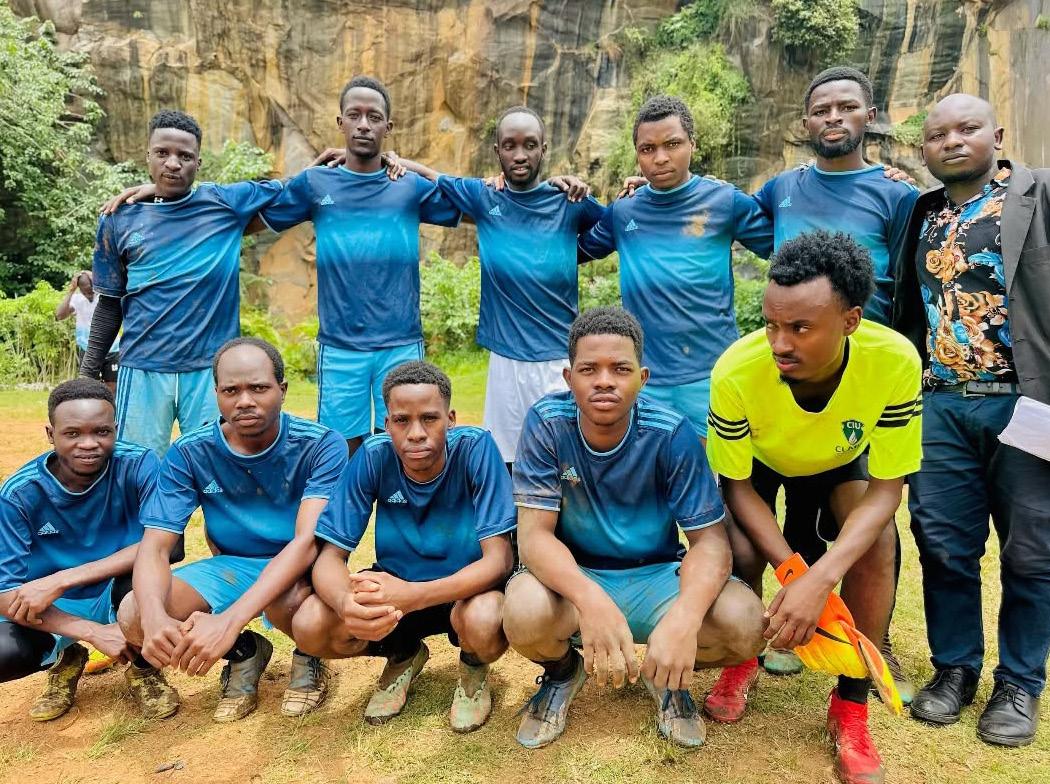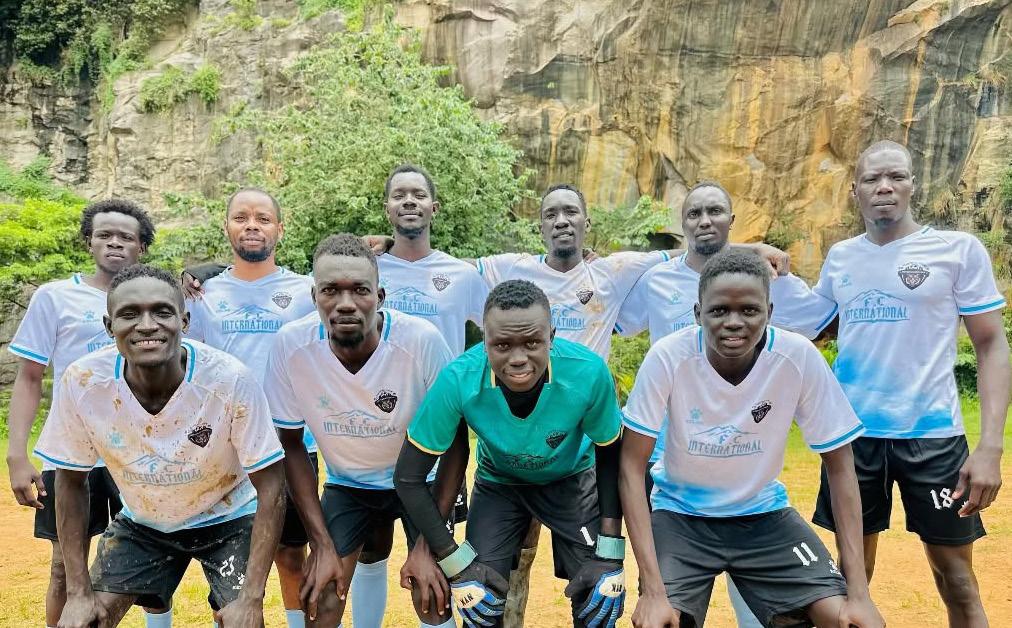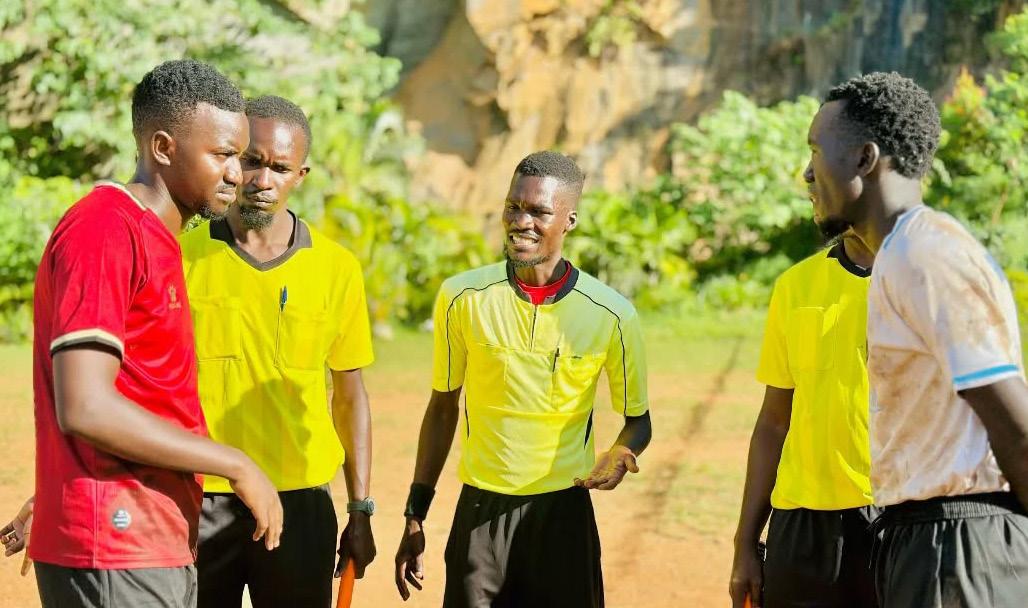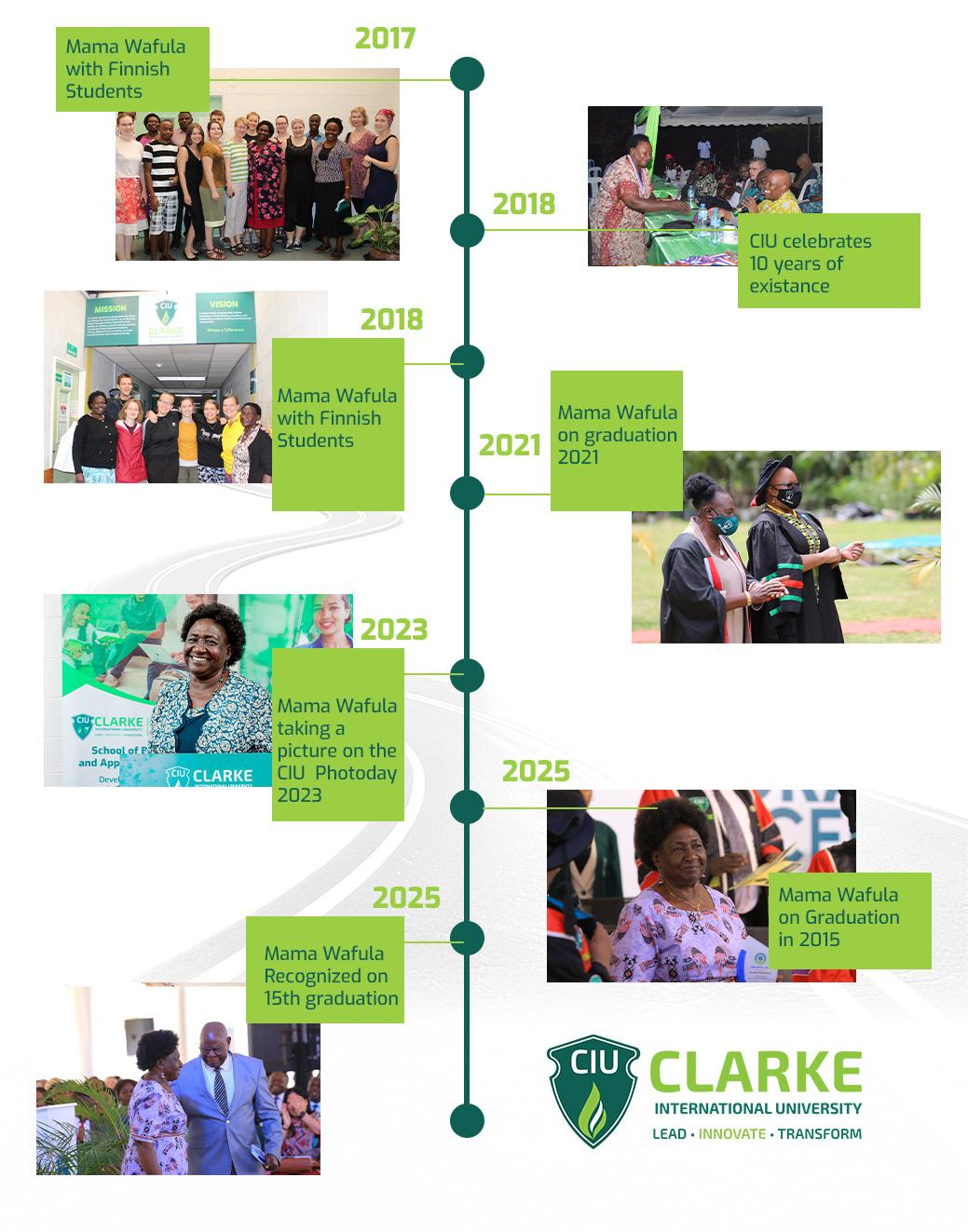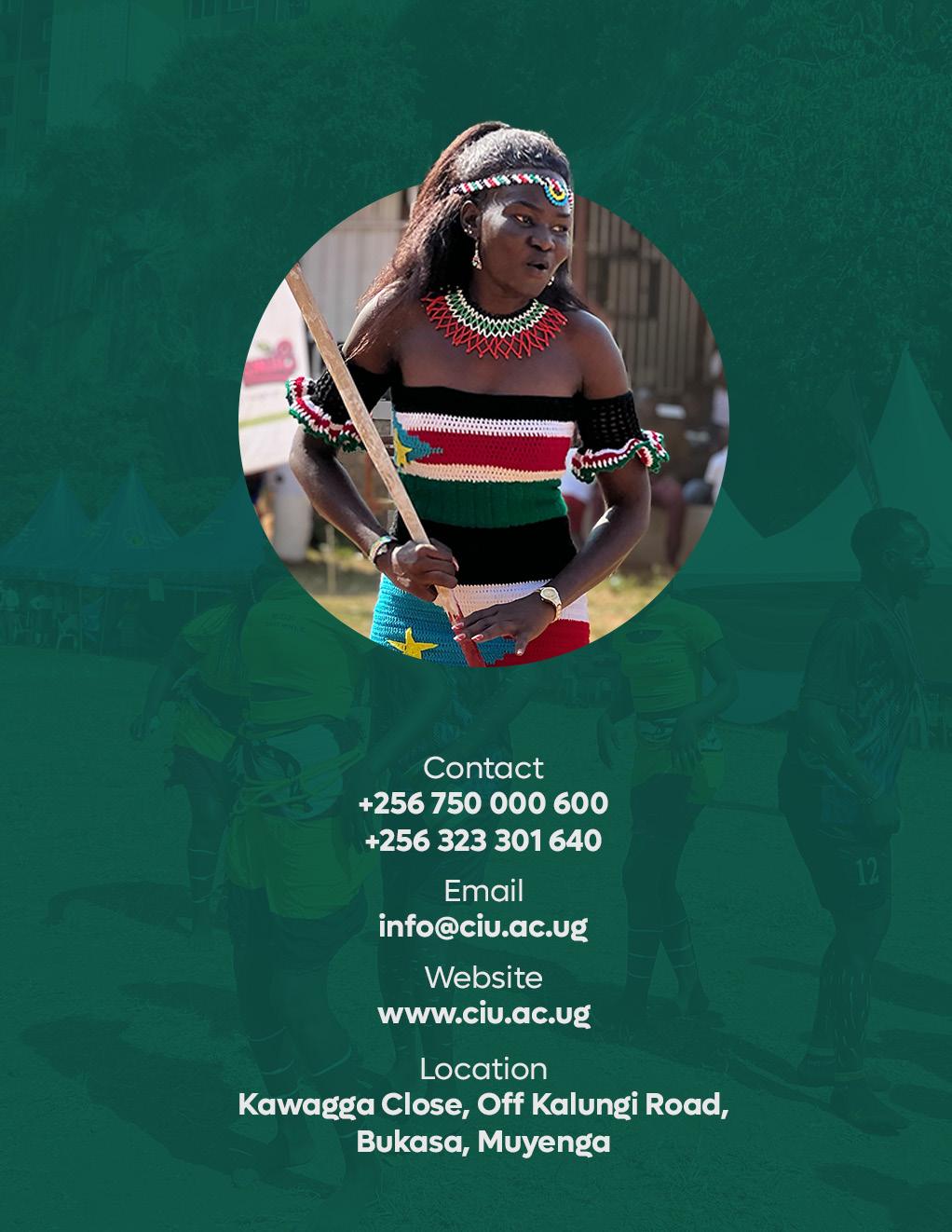




Editorial
CIU GRANTED CHARTER
Introducing Clarke Senior School
L.I.T series 2025
Strategic thinking in Leadership
Community Day 2025
Graduation Day 2025
Driving Africa’s Health Transformation highlights from VITENDO digital Symposium Africa 2025
Building a stronger CIU together
From team building to midnight dancing: CIU Staff party hits all the right notes
Mama Wafula journey at CIU through Pictures


As we navigate an exciting and transformative chapter at Clarke International University, this edition brings to light the voices, milestones, and movements that are shaping our institution and its future. From ciu finally landed the long awaited charter to the Vice Chancellor’s inspiring message to the dynamic LIT Series 2025, our commitment to leadership, innovation, and student growth continues to shine.
We reflect on key discussions around Strategic Thinking in Leadership and Driving Change in Higher Education, emphasizing our role as a catalyst for thought leadership in Uganda and beyond. Memorable events such as the Unforgettable Movie Night Experience and Community Day 2025 highlight the vibrant and inclusive culture that defines CIU.
The Graduation Day 2025 celebrations mark the triumph of resilience and academic excellence, while initiatives like Driving Africa’s Health Transformation underscore our mission to influence real change in the health sciences. From the Guild President’s Message to our spirited Interfaculty Football Showdown, student engagement continues to thrive.
We’re also proud to introduce the Clarke Senior School, an exciting new chapter in our commitment to lifelong learning and academic excellence.
Together, these stories form a tapestry of progress, unity, and bold vision. We invite you to explore, celebrate, and be inspired.
Nabimanya Editor , Inchief

Kampala, Uganda – Clarke International University (CIU) has achieved a historic milestone with the granting of a university charter by His Excellency, the President of the Republic of Uganda, on 3 July 2025. This landmark decision, following a rigorous evaluation by the National Council for Higher Education (NCHE), elevates CIU to the esteemed rank of chartered universities in Uganda, cementing its reputation for academic excellence, innovation, and transformative leadership.
The charter is a testament to CIU’s unwavering commitment to meeting the highest standards of governance, academic rigor, institutional sustainability, and financial integrity as outlined in the Universities and Other Tertiary Institutions Act, 2001 (as amended). It marks a pivotal moment in the university’s evolution from its founding in 2008 as the International Health Sciences University to its rebranding in 2017 as Clarke International University, reflecting its expanded mission across health sciences, business, applied technology, and public policy.
A Legacy of Excellence and Impact CIU has nurtured thousands of graduates who now lead in hospitals, NGOs, research institutions, and government bodies worldwide. The university’s programs in maternal and child health, critical care, digital health innovation, and business transformation have positioned it as a catalyst for national development.
Leadership’s Vision for the Future Professor Rose Clarke Nanyonga, Vice Chancellor of CIU, hailed the charter as a triumph for the entire CIU community: “This achievement is a validation of our relentless pursuit of quality and relevance in higher education. It reflects the dedication of our faculty, staff, students, alumni, and partners who have shaped CIU into a beacon of learning and innovation.” With chartered status, CIU is poised to:
• Attract world-class faculty and forge global research collaborations.
• Launch cutting-edge undergraduate and postgraduate programs aligned with Uganda’s development priorities.
• Strengthen partnerships with industry, government, and international academic institutions.
• Enhance degree recognition for students and alumni in the global job market.
CIU extends its deepest appreciation to the Ministry of Education and Sports, the NCHE, and His Excellency the President for their unwavering support. The university also acknowledges the contributions of its Founders, Council, management, faculty, staff, students, alumni, and partners. As CIU enters this new chapter, it reaffirms its founding vision: to cultivate ethical, entrepreneurial, and innovative leaders who drive transformative change. The university invites stakeholders, prospective students, and partners to join in celebrating this milestone and supporting its mission to empower communities locally, regionally, and globally.
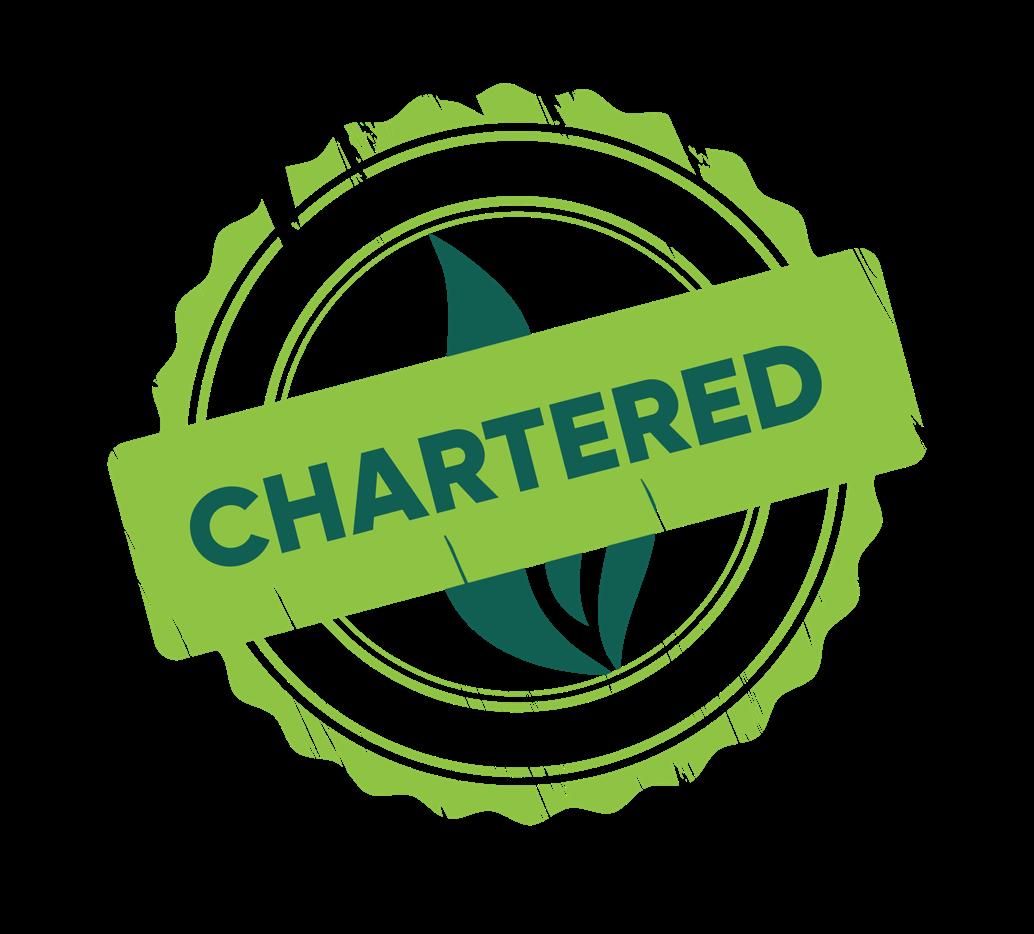

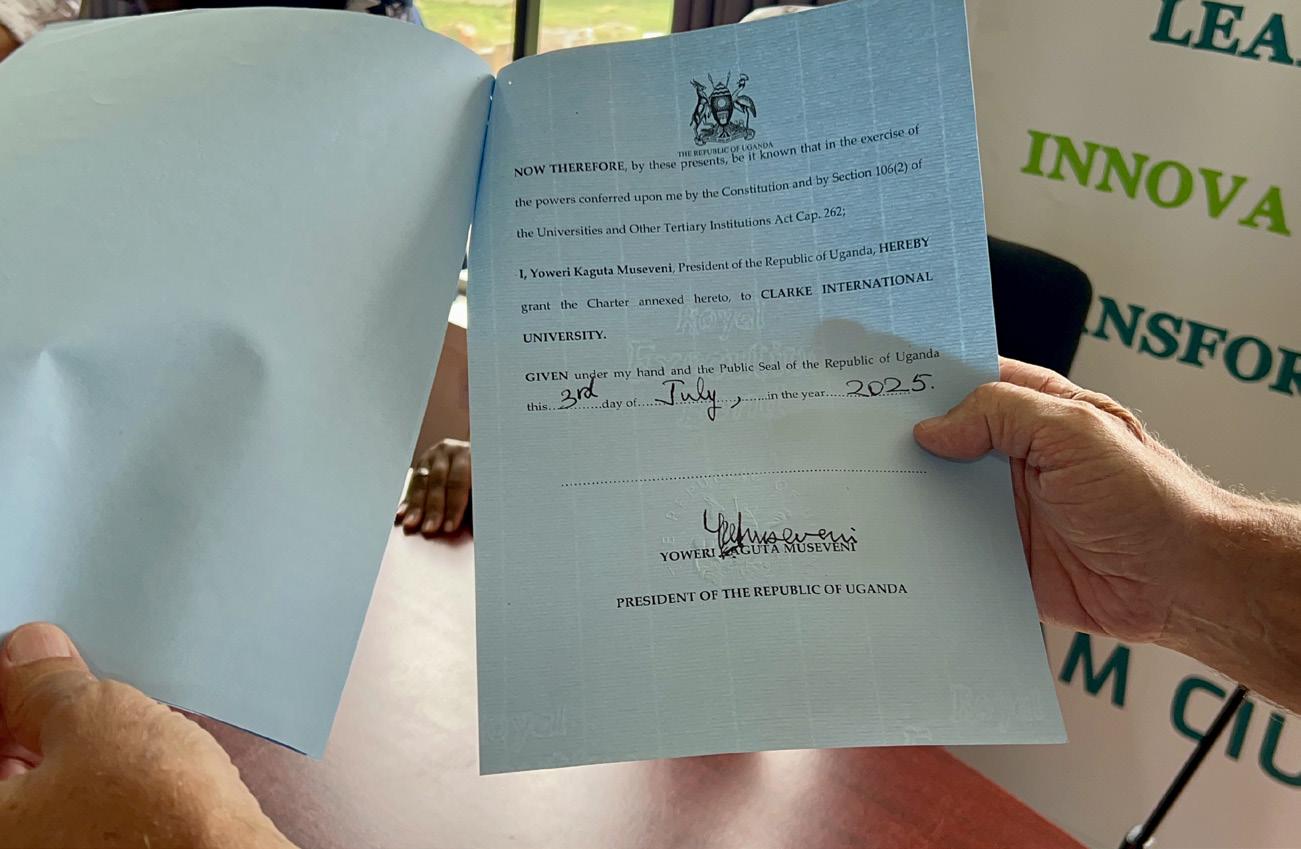









the position as the first appointed DVC. The transition from Yale’s academic prestige to the uncertainties of university leadership in Uganda happened almost invisibly, yet the contrast couldn’t have been more pronounced. Without precedent or guidance, I needed to quickly establish a supportive community.
Ten years ago, after completing my PhD at Yale, I decided to return to Uganda, a choice many of my mentors deemed “career suicide.” Their concerns weren’t unfounded. I was exchanging a clear professional trajectory for uncertainty, declining better-paying opportunities, and leaving behind world-class research infrastructure and an established network of mentors ready to advance my career. Uganda’s academic landscape presented stark contrasts to what I had grown accustomed to in the United States. Resources were limited, mentorship structures less defined, and career advancement opportunities appeared nebulous at best. Yet, I was compelled by something more profound than professional convenience, a desire to contribute meaningfully to a system that needed rebuilding from within, not from afar.
Shortly after assuming my role at Clarke International University (CIU), reality confirmed many of my mentors’ warnings. The support systems I had relied upon, readily available peer reviewers, writing groups, and proactive mentors who guided, critiqued, and championed me, were no longer present. Professional isolation set in, accompanied by uncertainty about how to develop in this new environment. Finding like-minded colleagues proved challenging, intensifying the sense that I had indeed stepped into uncharted territory.
My first day as Deputy Vice Chancellor at CIU passed without ceremony. There was no welcoming committee, no formal handover, I was pioneering
During my initial 100 days, I methodically set the tone for my leadership by securing key mentors and prioritizing critical issues. Among these mentors was Mrs. Elizabeth Merab Wafula, affectionately known as “Mama Wafula”, a woman of faith and distinguished midwifery lecturer whom I had known since I was 19. Our reconnection brought me immense joy, as she had witnessed my evolution from a somewhat directionless young nurse to an accomplished educator, supporting me with prayers throughout my journey. However, our relationship had been firmly established as mentor and mentee. I never anticipated the complexity that would arise when I suddenly became her supervisor. Our established dynamic was about to undergo a significant transformation, creating an unforeseen challenge in my new leadership role.
Our first official meeting in this new dynamic was undeniably awkward. Though the script had changed, neither of us knew our new lines. Mama Wafula maintained her characteristic warm, professional smile, but I sensed we were both navigating the invisible boundary between our past and present relationships. I grappled with how to address her, eventually settling on the familiar “How are you, Mama?”
The role reversal felt unexpectedly strange. As I sat across from her as the new DVC, I found myself wishing I could revert to our previous dynamic, sitting in her office with notebook in hand, absorbing her accumulated wisdom. While I couldn’t discern her thoughts, she never rushed me, never made me feel I needed to prove myself or that I didn’t be-

long. We both contemplated this peculiar twist: I was now her supervisor.
Nothing prepares you for becoming the boss of someone who is both a legend and who once guided you as a young professional. After our meeting, I wondered how to manage such a reversal without damaging our relationship. Was it possible to lead with authority while maintaining the deference that once came so naturally? This question lingered as I navigated my new responsibilities.
Despite the initial awkwardness, my encounters with Mama Wafula transformed my expectations about mentorship in Uganda. While the professional ecosystem differed significantly from what I had known at Yale, it wasn’t barren, just different.
Mama Wafula represented an unexpected mentor who didn’t fit the traditional mold I had grown accustomed to in the United States. This realization encouraged me to look beyond conventional sources for guidance. Gradually, I discovered a quiet but powerful community of local scholars, practitioners, and leaders equally committed to making a difference. Like Mama Wafula, they weren’t mentors in the traditional sense, but they shared a vision for transformation. Some were senior colleagues, others peers; some held formal titles, while others simply led by example.
What we lacked in formal structure, we
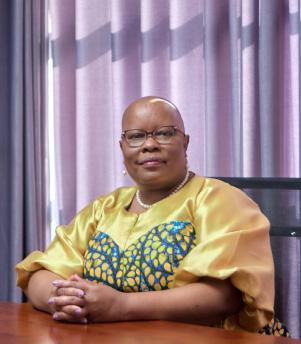
compensated for with mutual support, shared purpose, and a collective sense of responsibility to our communities. Through Mama Wafula’s example, I learned that mentorship is not only essential but also takes different forms across different settings. The mentors I desperately needed weren’t absent, they were right there in Uganda, offering guidance in ways I hadn’t initially recognized.
My initial months at CIU brought significant change and, inevitably, resistance to that change. During this challenging period, Mama Wafula demonstrated her exceptional character
once again. She would quietly enter my office to deliver a courtesy greeting, a simple reassurance that I was performing well. It was the same calming voice I had relied on years before, but now it was affirming my leadership. Her consistent elevation and affirmation of my role rewired something fundamental in my understanding of leadership and mentorship. Rather than resisting the institutional changes or my authority, she respected and reinforced both.
Through her actions, she embodied a profound truth: good mentors

don’t need to lead indefinitely. The best ones gracefully step aside when it’s your turn to lead, offering encouragement from just behind your shoulder. This is precisely what Mama Wafula did for me and, I’m certain, for many others throughout her career. Her approach to our role reversal taught me that true mentorship transcends hierarchical positions. It’s about recognizing potential, nurturing growth, and having the wisdom to know when to lead and when to support others’ leadership.
Since those early days of navigating our reversed roles, I’ve stopped trying to prove that I deserve my position in Mama Wafula’s presence. I’ve come to understand that I already earned my seat at the table. Now, my focus has shifted to honoring the journey that brought us both to where we are, her decades of service and my path from student to leader, and embracing the delicate dance of leadership that sometimes means letting go while remaining present.
Through Mama Wafula’s example, I’ve learned several invaluable lessons about leadership and mentorship. First, that mentorship isn’t always packaged the same way in every setting, it can be formal or informal, direct or subtle, but it’s always transformative when genuine. Second, that the best mentors know when to step back and allow those they’ve guided to flourish independently. And third, that leadership transitions, even when they involve role reversals, can strengthen rather than diminish relationships when approached with mutual respect.
These lessons have profoundly shaped my own approach to mentoring others. I strive to create spaces where guidance is offered without imposing, where potential is recognized and nurtured, and where transitions in authority are handled with grace and dignity, just as Mama Wafula demonstrated in our relationship.
Honoring Mama Wafula’s Legacy
This year, we honor Mama Wafula, mentor, midwife, leader, teacher, colleague, and friend. Her impact extends far beyond her formal roles at CIU. Through her quiet strength and unwavering support, she has shaped generations of healthcare professionals and leaders in Uganda, creating positive change that continues to spread throughout the healthcare system and academic community.
What makes Mama Wafula’s mentorship so exceptional is its authenticity and adaptability. She never sought recognition or accolades for her guidance; instead, she offered wisdom freely, adjusted her approach to meet individual needs, and celebrated others’ successes as if they were her own. When institutional roles shifted and I became her supervisor, she demonstrated the rare ability to transition gracefully, maintaining our mentorship bond while respecting new professional boundaries.
As we celebrate her contributions, we also commit to carrying forward her legacy of genuine mentorship. In a world that often prioritizes formal credentials and structured programs, Mama Wafula reminds us that some of the most powerful mentoring happens in quiet moments of affirmation, in the consistent demonstration of values through action, and in the willingness to both lead and follow as circumstances require.
Thank you, Mama Wafula, for being present, not just physically, but fully present with your wisdom, your faith, your encouragement, and your unwavering belief in those you mentor. Your legacy lives on in every life you’ve touched and in every leader you’ve helped to shape. We honor you.
By Assoc.Rose Clarke Nanyonga Vice Chancellor


As Clarke Junior School approaches its 10th anniversary at the end of this year, we are filled with excitement and gratitude. For the past decade, we have pursued an ambitious vision: to redefine how education is delivered using the Ugandan curriculum, with world class standards. Through small class sizes, a low student-to- teacher ratio, and a learner-focused approach, we have nurtured enthusiastic, confident, and lifelong learners.
At Clarke, our mission is to nurture learners who are curious, capable, compassionate, an committed to lifelong learning. We believe that every child deserves an education that unlocks their full potential one that goes beyond exams to build character, creativity, and confidence. Our vision is to shape a new kind of Ugandan graduate: one who thinks critically, leads ethically, solves problems with purpose, and contributes meaningfully to their community and the wider world. Clarke Senior School continues this commitment by extending our values into the secondary school years, preparing young people not just for O-Level success, but for life. As part of our 10-year celebration, we are proud to introduce the next chapter in our educational journey Clarke Senior School (CSS).
Building on the strong foundation of Clarke Junior School, Clarke Senior School will open in 2026, continuing and expanding our mission to transform education in Uganda. Our aim is to provide a forward-thinking, high-quality secondary education experience rooted in our core values of excellence, curiosity, creativity, and compassion.
Clarke Senior School is uniquely positioned to deliver the revised O-Level UNEB curriculum with excellence. The new curriculum has been modernised to reflect
the needs of a changing world shifting away from rote learning toward critical thinking and realworld problem-solving. While many schools with large class sizes and didactic teaching methods may struggle to meet these new demands, CSS is ready:
Our students already have a strong foundation in critical thinking and inquiry-based learning. We are experienced in recruiting and developing teachers who align with our learner-centered philosophy.
Our intentionally small class sizes and low student-to-teacher ratio provide the perfect environment for personalised learning and academic success. This is more than just a school expansion it is a bold step forward in shaping a new generation o thinkers, leaders, and change-makers in Uganda.
Clarke Senior School at a Glance: Opening in 2025 with Senior 1 and Senior 2 classes Located in Bukasa, Kampala Offering a limited boarding section Discounts available for early applications. To learn more or express interest, please get in touch we’d love to welcome you on this exciting journey with us.
Sean Clarke
CEO Clarke Group Education


The Clarke International University (CIU) Leadership Innovate Transform (L.I.T) Series made a triumphant return, uniting students and professionals for an insightful session on “Selling One’s Personal Brand.”
Led by the esteemed Mr. Daniel Choudry, the session offered invaluable lessons on self-presentation, resilience, and strategic career growth. In today’s digital world, Choudry emphasized that one’s online presence defines their identity, famously stating, “If your image doesn’t show up on Google, you don’t exist.” This highlighted the importance of being intentional about what we share online, as every post, comment, and interaction shapes public perception. Managing one’s digital footprint wisely is key to building a strong and professional brand.
Choudry also spoke passionately about the importance of grit, urging attendees to adopt the mindset of “Rest when the job is complete, not when tired.” He encouraged goal-setting with purpose— what he metaphorically called “finding a Kampala to chase”—and emphasized pushing through difficulties with determination. To truly stand out, he explained, one must go beyond superficial conversations and engage in meaningful, inspiring dialogue that strengthens both professional and personal relationships. A standout quote from the session was, “If you’re not actively branding yourself, be prepared for others to define your brand for you.” This called for self-awareness and the ability to clearly communicate one’s unique strengths and values.

Another key insight was the concept of embracing challenges as opportunities for growth. Choudry inspired participants to adopt a “thrive” mentality, viewing hardships not as roadblocks but as stepping stones to success. He also shared a compelling analogy between kitchen preparation and the dining experience: while the world may only see the polished version of ourselves, that image is built through countless hours of unseen hard work, discipline, and learning. The session concluded with a powerful reminder that success is a journey requiring intention, effort, and perseverance. As the L.I.T Series continues, it reaffirms CIU’s commitment to developing leaders who are not only skilled but also deeply self-aware and purpose-driven.
In a compelling address to students at Clarke International University, a remarkable female aviator and entrepreneur Capt Ashaba Faridah delivered a powerful message about personal responsibility, ambition, and the realities of life that young people—especially women—must confront. Drawing from her own life experiences in the aviation industry and business world, she urged students not to conform to societal norms or peer expectations but to think independently and act with purpose. She shared how her own journey began with a decision that set her apart: to become a pilot in a field where few women dared to enter. Rather than seeking employment like most of her peers after school, she decided to build something for herself. It was a risk, but it came from a conviction that she didn’t have to think or act like everyone

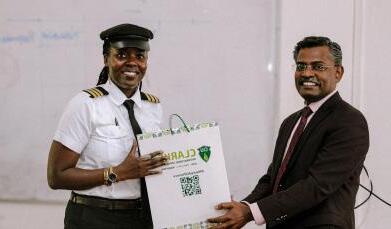
else. Her message to the students was clear—embrace your uniqueness, because your difference is your strength. It’s that bold thinking that allowed her to go from being a student to running her own aviation tour company, where she now employs pilots instead of flying the planes herself.
Throughout her speech, she emphasized the need for constant personal evolution. Using biology as an analogy, she reminded students that only those who adapt survive. Life, she said, is about reinvention. If one dream fails, find another. If a door closes, build a new one. According to her, the human brain is like software—it must be updated. Rigid thinking leads to stagnation. She challenged students to remain flexible, sharp, and self-aware. Intelligence, she noted, is not measured solely by academic results but by how you navigate real-life challenges. Being book-smart without street smarts won’t get you far in a world that demands both.
One of the most practical lessons she shared centered around the value of relationships. Success, she argued, is not always about who you already know, but who you choose to build connections with. The people around you—your classmates, lecturers, peers—may become influential figures tomorrow. She encouraged students to be intentional about their networks, to seek out individuals who push them to grow, and to avoid environments that tolerate complacency. If you’re always the smartest person in the room, she warned, you’re in the wrong room.
Her insights on financial discipline and humility were equally hard-hitting. She candidly admitted that while in flight school, she sold juice and handmade jewelry to survive. There was no shame in it—it was honest hustle. She warned students against pride and ego, especially when struggling. Being broke and proud, she said, is a dangerous combination. Real wealth comes not from sudden windfalls but from discipline, focus, and consistent effort. She recounted the
story of a friend who inherited over a million dollars and lost it all within months, a stark reminder that money without wisdom is fleeting.
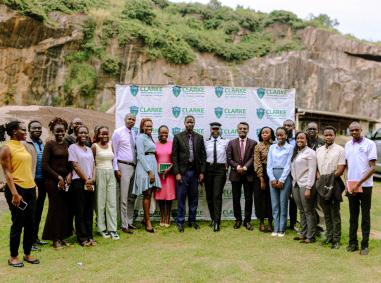
young women in the audience. With passion and urgency, she called on them to rise above limiting beliefs and societal pressure. She challenged the idea that a woman’s success is tied to marriage or motherhood, arguing that such thinking diminishes the value of education and ambition. University, she stressed, is not a waiting room for marriage but a platform for purpose. She urged girls to dream bigger, work harder, and refuse to settle for shallow achievements. As future mothers, leaders, and professionals, women shape the next generation. If they lack depth, so will their children. If they lack vision, so will the communities they raise.
As the speech came to a close, the message resonated clearly: take ownership of your life. No one is coming to save you. It’s up to you to use your brain, apply yourself, and build something meaningful. Her own story—from a young pilot in training to a successful businesswoman— stood as living proof that with boldness, humility, and relentless effort, it is possible not just to navigate life, but to soar through it with purpose.


Clarke International University (CIU) was proudly represented by its Vice Chancellor, Dr. Rose Clarke Nanyonga, at the 13th Academia-Public-Private Partnership Forum (APPPF), held from March 12 to 14, 2025, in Kigali, Rwanda. The forum, organized by the Inter-University Council for East Africa (IUCEA), brought together key stakeholders from academia, industry, and government across the East African region. Dr. Nanyonga not only attended as Vice Chancellor of CIU but also as a distinguished board member of IUCEA, further underscoring her leadership role in shaping the future of higher education in the region. The forum was officially opened by Rwanda’s Minister of Education, Hon. Joseph Nsengimana, who emphasized the need for dynamic and inclusive education systems that address real-world challenges and equip graduates to be job creators and innovators.
Throughout the three-day event, Dr. Nanyonga engaged in high-level conversations focused on strengthening partnerships between universities, industries, and policymakers. Discussions revolved around key themes such as aligning academic research with industry needs, leveraging innovation to address community challenges, and enhancing entrepreneurship through university-led in-



novation hubs. Participants emphasized the importance of applied research, industry-driven curricula, and strategic investment in technology to close the gap between classroom learning and practical solutions. During the opening ceremony, two landmark initiatives were launched: the Research Excellence Framework for Higher Education in East Africa (REFHE-EA) and the IUCEA University-Industry Collaboration Strategy, both of which aim to improve the relevance, quality, and impact of research in the region.
Dr. Nanyonga’s participation reflected CIU’s growing presence on the regional stage as a forward-thinking and impact-driven institution. Her voice at the APPPF 2025 reaffirmed CIU’s commitment to contributing to transformative education, fostering innovation, and building collaborative relationships that enhance sustainable development across East Africa. As a university

deeply rooted in values and community-centered learning, CIU continues to play a vital role in shaping policies and practices that bridge academia and industry for the benefit of society. Dr. Nanyonga’s representation not only elevated CIU’s visibility but also reinforced the university’s dedication to regional integration, academic excellence, and real-world impact.


Clarke International University recently hosted a thought-provoking leadership session featuring Professor Lauren, one of the United Kingdom’s most decorated and influential black leaders. As the Chairperson of Sheffield Children’s NHS Trust, Director of Laura Seren Limited, and an executive leadership coach, Professor Lauren brought to life the essence of strategic thinking in leadership through powerful storytelling, personal experience, and intellectual insight.
Her address to CIU’s staff and students went far beyond the textbook definitions of leadership. “Leadership isn’t about your title—it’s about how you choose to show up every day,” she said, sharing her inspiring journey from starting out as a nurse—intentionally choosing that path over medical school— to becoming a leader shaping healthcare policy and inclusion strategies at national levels. This, she emphasized, is the heart of strategic leadership: the courage to own your path, stay mission-focused, and think beyond the moment.
Professor Lauren’s distinguished career spans healthcare, higher education, workforce development, media, and child inequality advocacy. She is the architect of a groundbreaking research framework that explores the human experience, especially of those on the margins. Her accolades include being named one of the BBC’s eight most influential Black Britons, receiving the Commander of the British Empire (CBE) and the Freedom of the City of London in 2024. Her work with government agencies to amplify underrepresented voices continues to redefine what inclusive leadership looks like.
Her message at CIU was clear: strategic leadership is not a destination but a mindset—rooted in self-awareness, grounded in purpose, and driven by a commitment to serve. As CIU continues to cultivate the next generation of transformative leaders, her insights offer a powerful reminder: the most strategic move a leader can make is to lead authentically, inclusively, and with vision.



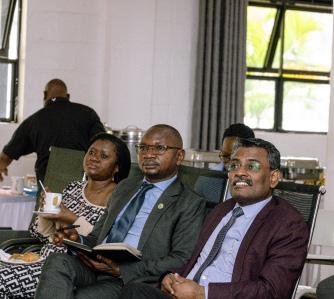

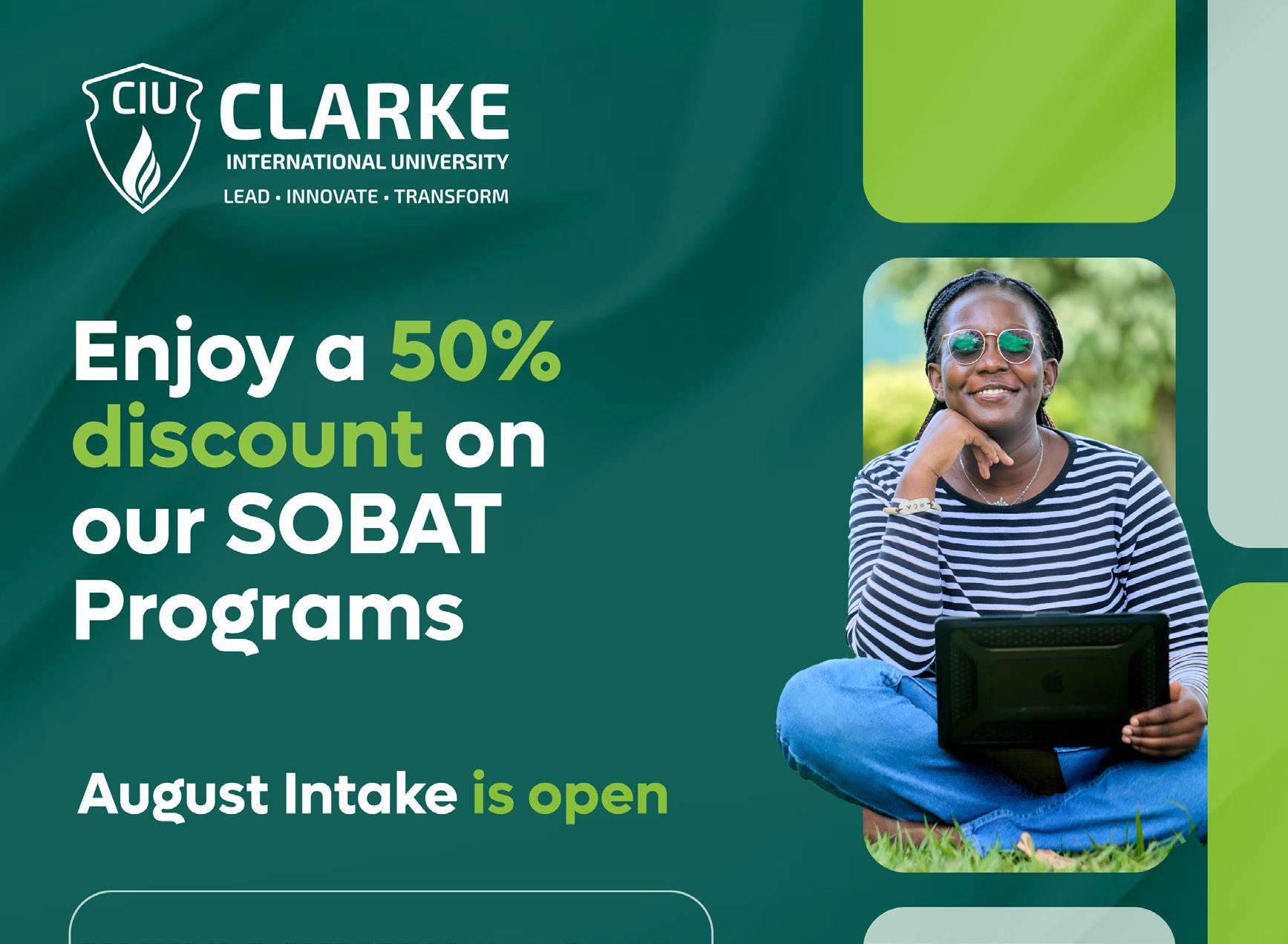



On the eve of Community Day, Clarke nternational University (CIU) came alive with energy, excitement, and a sense of community as the Students’ Guild, in partnership with MTN Pulse, hosted an unforgettable Movie Night at the iconic Rock Arena.
As the sun set, the Rock Arena was transformed into a magical outdoor cinema. The venue was beautifully set up with cozy mats, soft lighting, and a massive projection cast directly onto our beloved rock. Students gathered in groups, wrapped in blankets and laughter, ready to experience something truly special.
The night was more than just a movie screening it was a full-blown experience. Popcorn stations added the perfect cinema vibe, while virtual reality games introduced an exciting tech twist that kept everyone entertained before the film began. The joyful buzz was undeniable as students mingled, took photos, and shared stories under the stars.

In a wonderful display of unity and collaboration, CIU also welcomed students from other universities, turning the night into a celebration of friendship and shared experiences across campuses.
Speaking about the event, a member of the Guild said, “Our goal was to create something memorable for our students and to kickstart Community Day with great energy and we couldn’t have done it without MTN Pulse. We’re proud of what we achieved together.”
As the credits rolled and the night drew to a close, one thing was

certain: the Guild and MTN Pulse had created a moment that would be talked about for months to come a true highlight of the CIU calendar.


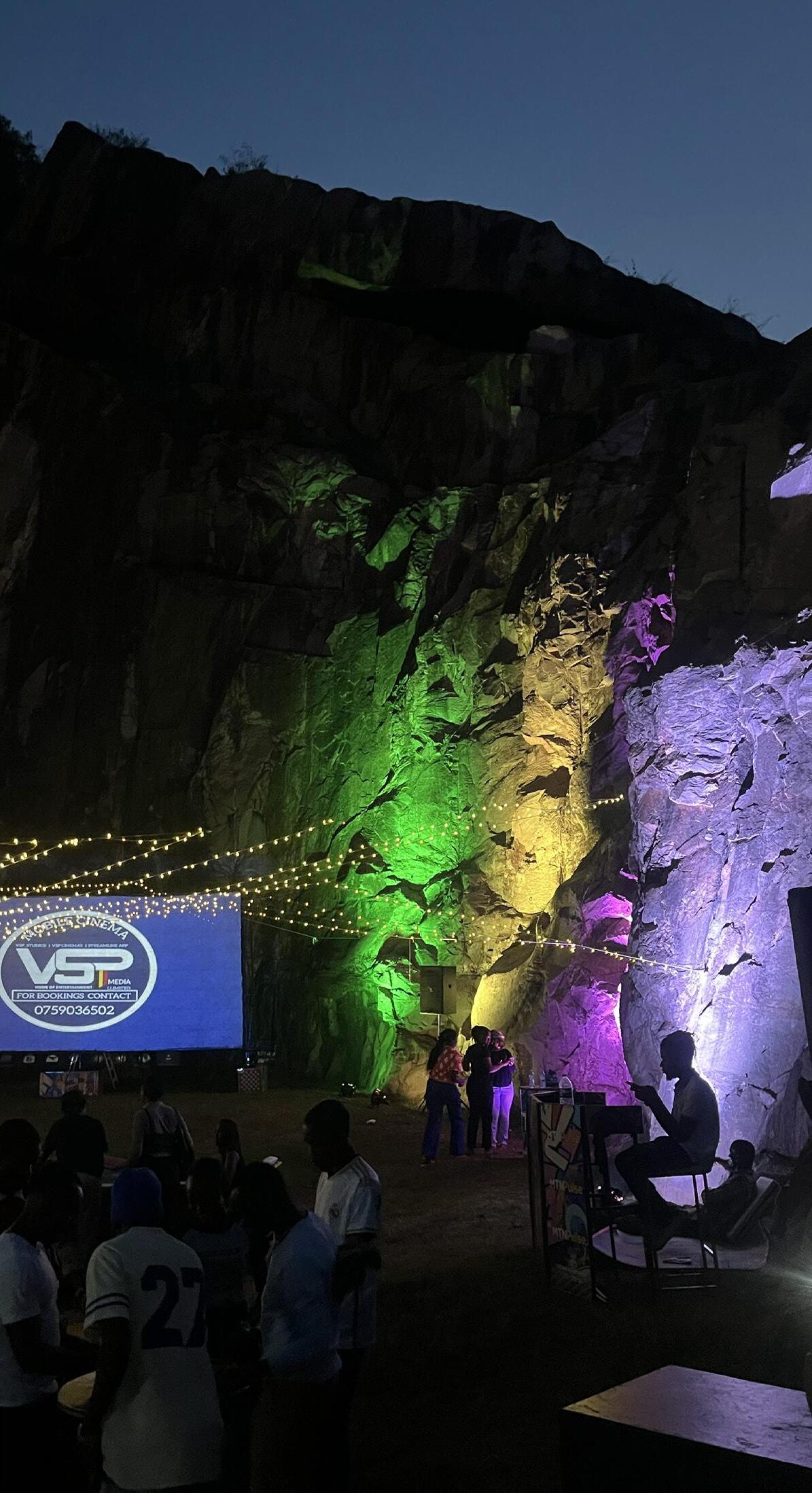



March 3, 2025
The CIU 5th Community Day was a remarkable event that brought together students, staff, parents, and the general community for a day filled with health services, cultural performances, and business exhibitions. The day featured free medical services, entertainment, and vendor showcases, making it an engaging and impactful occasion for all attendees. From early morning, the campus was bustling with excitement as people turned up in large numbers to participate in various activities.
Health and wellness took center stage, with a fully equipped medical camp offering free screenings, immunizations, and consultations. Services included HIV and Hepatitis B testing, cancer screenings, and nutritional assessments, provided by partners such as Uganda NCD Aliance,C-Care Uganda, Kisugu Health Center, Uganda Cancer Institute
Gynius Plus AB Africa contributed significantly by providing free cancer testing kits, ensuring that more people could access early detection services. Uganda Blood Bank facilitated blood donations, allowing participants to make a life-saving impact. In addition to medical services, the event celebrated cultural diversity with captivating performances from CIU students,
showcasing Baganda, Acholi, Eritrean, South Sudanese, and Sudanese traditional dances. Eritrean students also presented their cuisine, offering attendees a taste of their rich cultural heritage. The excitement continued into the evening with a surprise performance by Ava Peace, which thrilled the crowd.
Local businesses and vendors had the opportunity to showcase their products, ranging from food and beverages to jewelry, cosmetics, and insurance services. Organizations like Centenary Bank, Absa Bank Uganda, Stabex International Limited, Bronson Canadian School and UAP Old Mutual provided financial literacy and career guidance, while Lens and Frames Opticians offered free eye check-ups. The event created an excellent platform for networking and economic empowerment within the community.
The CIU Community Day was a true reflection of togetherness, wellness, and cultural appreciation. With the overwhelming turnout and enthusiastic participation it reinforced the university’s commitment to serving the community beyond academics. The success of this event would not have been possible without the dedication of partners, vendors, students, and staff, who all played a vital role in making the day memorable.


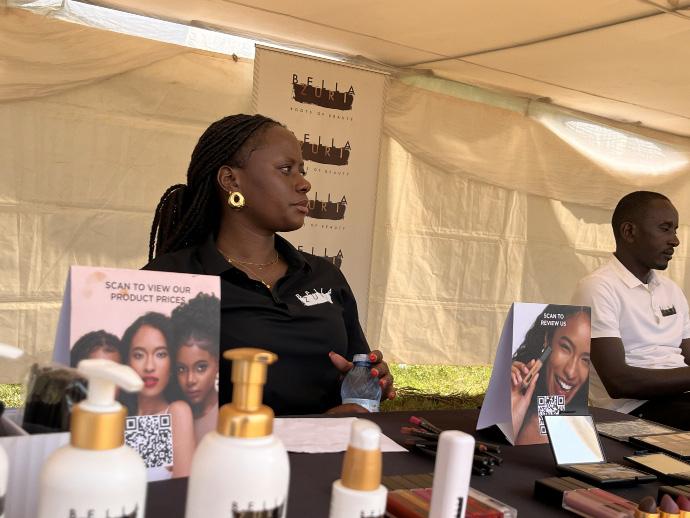

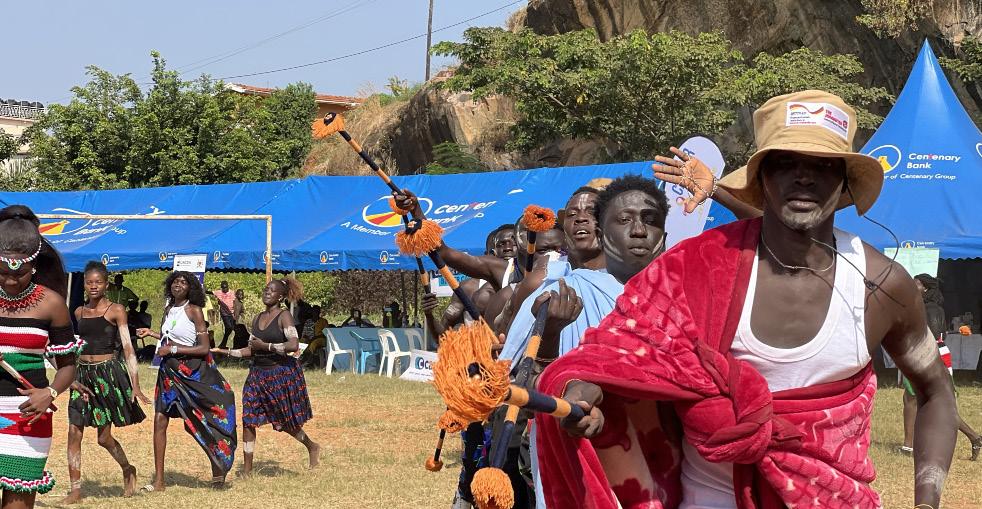
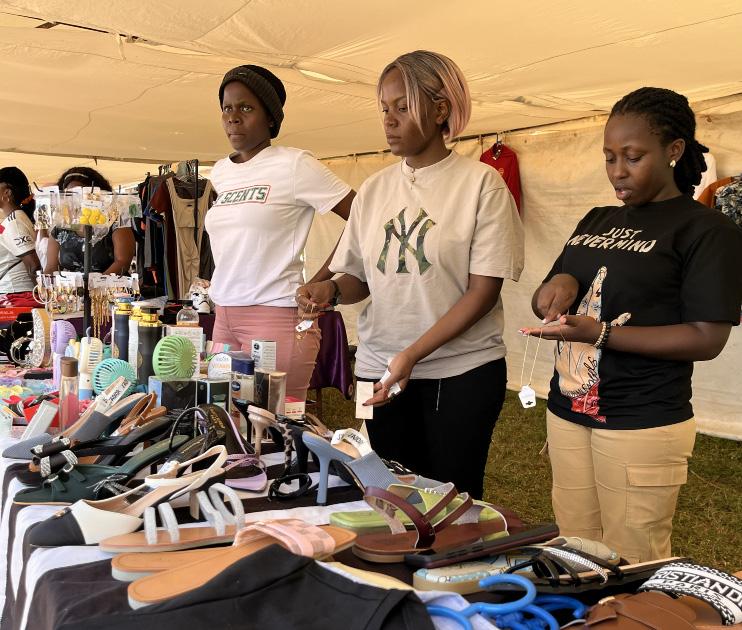


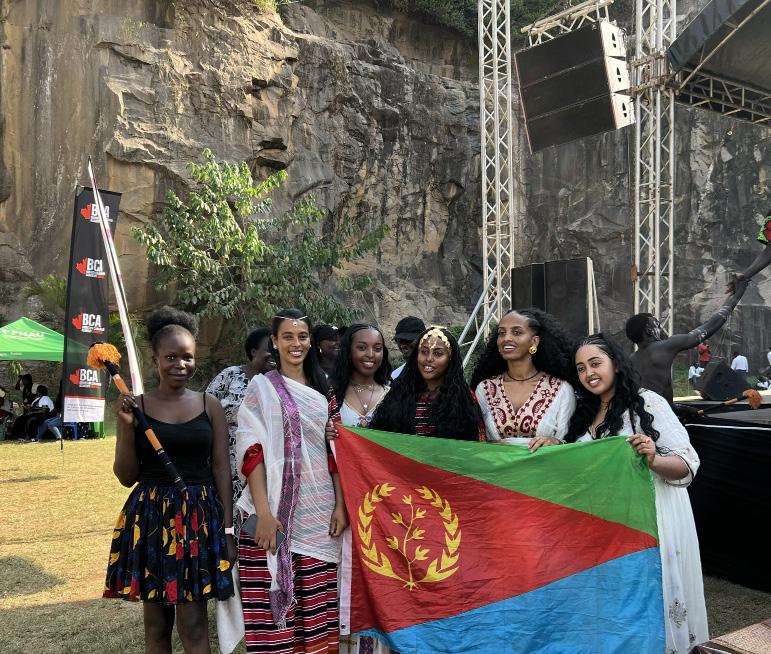




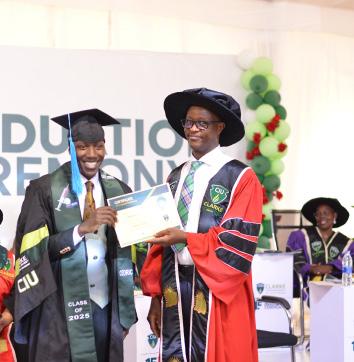

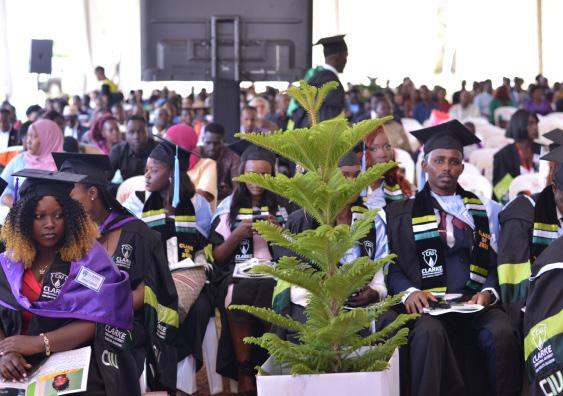




Clarke International University Celebrates 15th Graduation: A Call to Lead with Purpose and Innovation
Kampala, Uganda – Clarke International University (CIU) commemorated its 15th graduation ceremony on March 21, 2025, at the iconic Rock Arena, celebrating over 464 graduates poised to shape the future of healthcare, business, technology, and public service. The event blended inspiration, reflection, and a rallying cry for graduates to tackle societal challenges with integrity and creativity.
Wisdom from the Podium: A Journey Beyond the Certificate
The ceremony was graced by two distinguished voices: Justice Christopher Izama Madrama of Uganda’s Supreme Court and Mr. John Chryssestom Muyingo, State Minister for Higher Education. Both leaders framed graduation not as a finale but as a launchpad for lifelong impact.
Justice Madrama, the commencement speaker, urged graduates to view their achievements as a “milestone in the unending journey of learning.” He emphasized integrity, resilience, and community as non-negotiable values. “True success lies in uplifting others and standing accountable for your choices,” he asserted, challenging the cohort to prioritize collective progress over individual gain.
Mr. Muyingo, the Guest of Honour, echoed this vision, describing graduation as a “gateway to responsibility.” He called on graduates to redefine leadership by mastering principles from Robin Sharma’s The Leader Who Had No Title, a book he recommended as essential reading. Innovation, he stressed, must fuel Uganda’s development. “The world evolves rapidly—stay curious, embrace new ideas, and never stop learning,” he advised, linking lifelong education to national progress. Bridging the Gap: Addressing Education Affordability
The celebrations unfolded amid growing concerns over rising education costs in Uganda, which continue to
hinder professional advancement for many. While government loan schemes provide partial relief, financial barriers persist. CIU’s Vice-Chancellor, Dr. Rose Clarke Nanyonga, addressed the issue head-on, reaffirming the university’s commitment to inclusivity.
“Education is a right, not a privilege,” Dr. Nanyonga declared. She highlighted CIU’s scholarship programs, flexible payment structures, and industry partnerships designed to ease financial burdens. “Our mission is to equip graduates with skills that transcend economic challenges, empowering them to thrive and uplift communities,” she added.
The graduating class embodied CIU’s regional influence, with students hailing from Uganda, Kenya, Tanzania, and Rwanda. Top performers, including Public Health star Sarah Kintu and David Omondi, creator of a low-cost water purification system, received special accolades. Their achievements underscored the university’s role in cultivating leaders who blend academic excellence with practical ingenuity.
As the ceremony concluded, Justice Madrama left graduates with a resonant charge: “Your degree is a foundation, not a ceiling. Build upon it—for your future, and for humanity’s.”
In an era marked by inequality and technological disruption, CIU’s 15th graduation served as both a celebration and a challenge. The university continues to mold leaders equipped to navigate complexity with innovation, ethical courage, and an unwavering commitment to service. For these graduates, the journey has just begun.

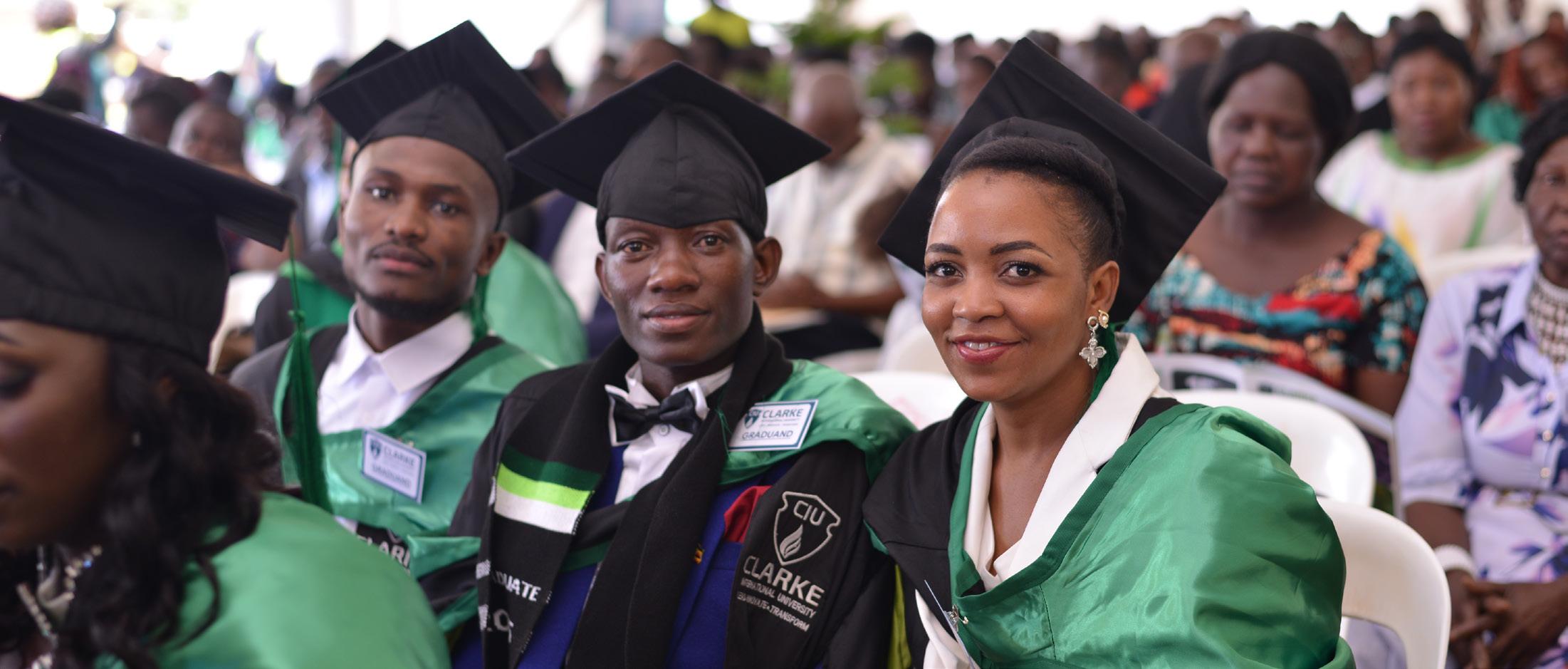
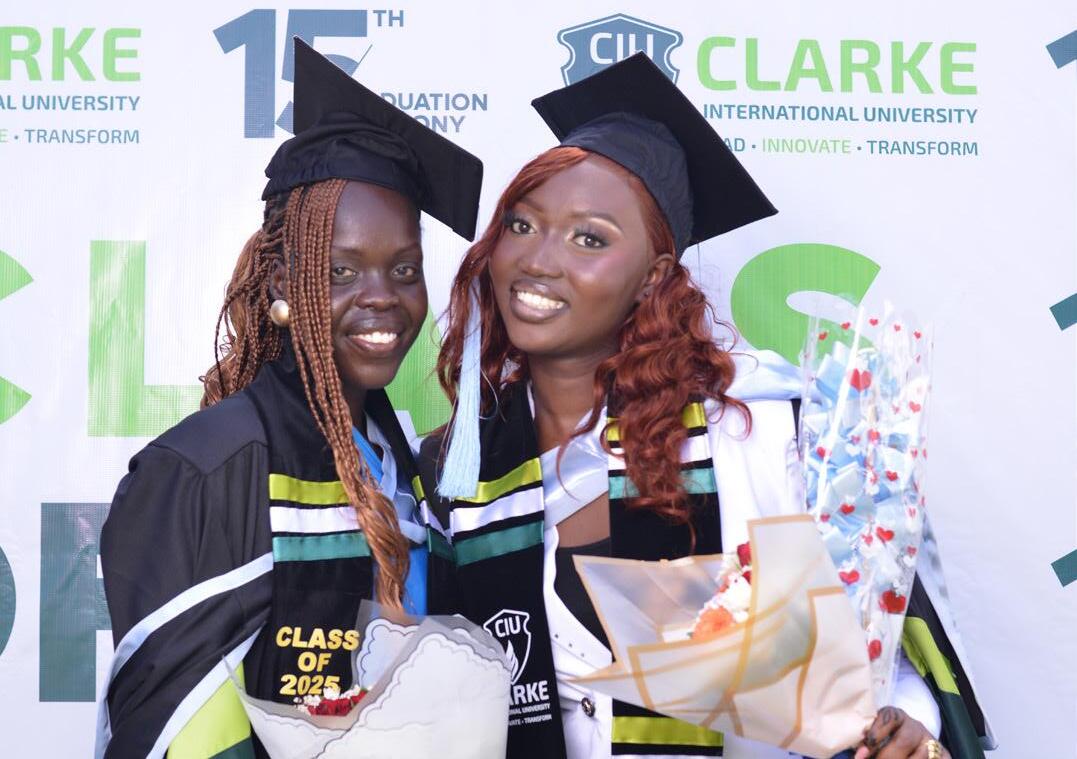
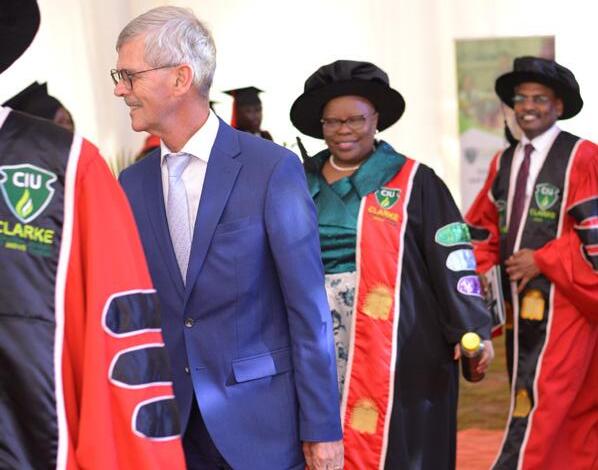

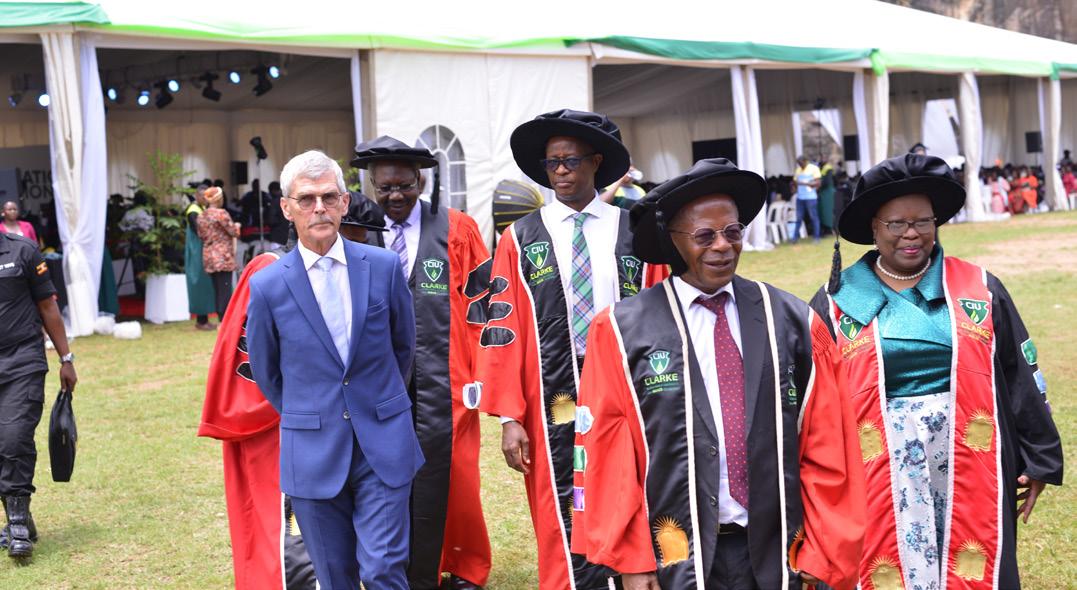
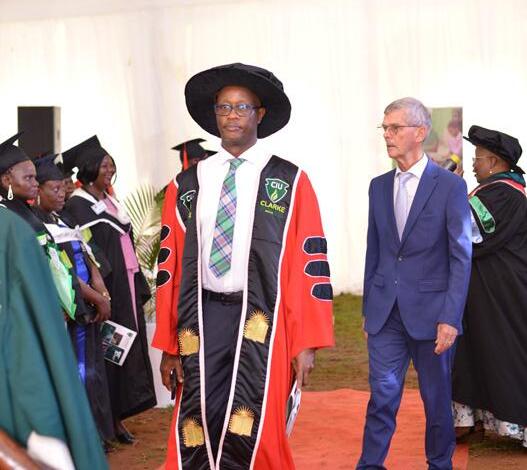


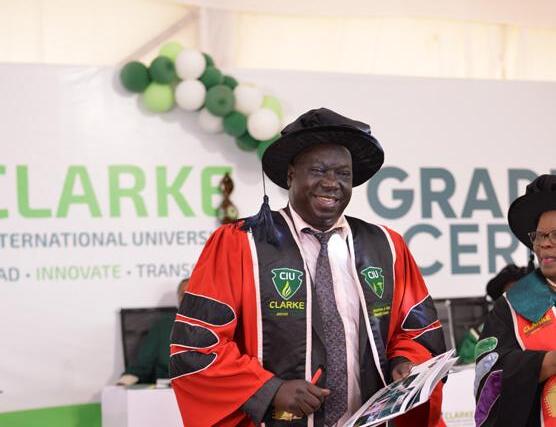



Organized by Clarke International University and Mobiklinic Foundation, the Vitendo Digital Health Symposium Africa 2025, held at Hotel Africana, brought together thought leaders, innovators, academics, and practitioners to shape the future of digital healthcare in Africa. The symposium focused on real-world innovations and policy frameworks that can bridge the gaps in access, infrastructure, and delivery of healthcare services across the continent.
Key conversations centered on revolutionary approaches like mobile health applications empowering community health workers, electronic health records, and telemedicine closing the gap between urban and rural populations. AI integration and innovative SMS systems for maternal health were highlighted as scalable solutions. Speakers also underlined the importance of interoperable data systems, robust regulatory frameworks, and strong public-private partnerships in delivering inclusive and sustainable health innovations.
Dr. Milka Singh, Chief of Future Engagement (CFE), shared transformative insights on what it takes to build an enabling environment for health innovation. He emphasized that innovations must be locally relevant, affordable, adaptable, and accessible to thrive. Drawing from his experience with launching Gleeve.ug, he highli -
ghted the funding challenges local innovators face and the importance of investing in ideas that serve community needs. His reflections underscored that without appropriate financial systems and supportive policies, Africa’s digital leap risks leaving local talent behind.
Dr. David Jolly Muganzi emphasized the importance of aligning innovations with national, regional, and global health priorities. He stressed the value of viable business models and the need to spotlight successful solutions. His remarks on the Investing in Innovation (i3) initiative revealed how collaboration, strategic thinking, and a strong innovation ecosystem can fuel progress across multiple countries.
Edwin Mulwa of VillageReach reinforced the role of digital tools in improving patient outcomes and system efficiencies. He called for scalable solutions, public-private partnerships, and investments in local talent, urging Africa to take charge of its own health tech narrative. In line with this, Dr. Yacoub Hachine’s session demonstrated how wearable technologies and fitness apps are helping combat non-communicable diseases through measurable outcomes, such as increased physical activity and improved glucose control.
Dr. Rose Clarke Nanyonga, Vice Chancellor of Clar-
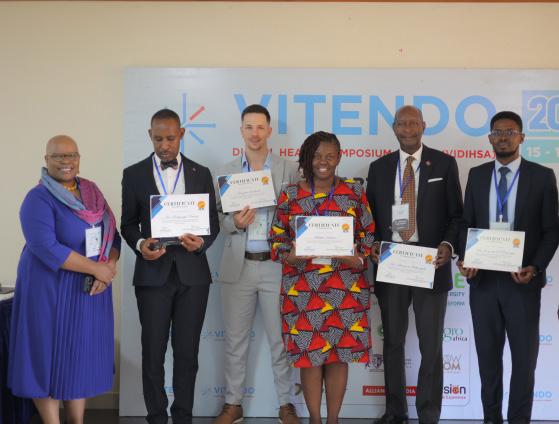

ke International University and a board member of the Inter-University Council of East Africa, delivered critical remarks that highlighted the multifaceted digital gap affecting access to technology, internet, and digital literacy. She outlined five key pillars essential for successful digital health transformation:
1. Leadership and political commitment—government structures must lead the digital agenda with consistent investment.
2. Robust digital infrastructure—affordable and resilient tech backbones are essential.
3. Human Resources for Health—health professionals need upskilling and reskilling.
4. People-centered solutions—tools must be culturally sensitive and grounded in local realities.
5. Research, innovation, and evidence—decisions must be driven by data and adaptive learning frameworks.
Michael Niyitegeka from Refactory Academy spoke about closing the gap between academic training and industry readiness, especially in software development. He noted that understanding the problem (70%) is more important than coding skills (30%), and emphasized the need for real-world learning, digital literacy, and AI-friendly infrastructure. He advocated for digitised workflows and developing localised


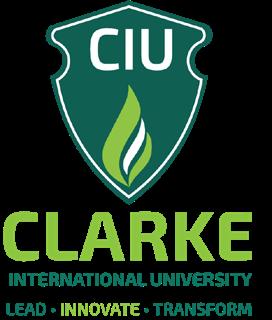

AI models to make tech truly relevant.
Julian Rweju, Acting Director of DEGS at NITA Uganda, detailed NITA’s role in expanding digital infrastructure, such as connecting 1,872 sites including health facilities across 17 districts. She reiterated the importance of interoperability, AI adoption, and last-mile connectivity, despite funding challenges.
Several speakers brought community-centered perspectives to the symposium. Dr. Miiro stressed the importance of building trust in digital health through community education and data protection, while Dr. Prosper emphasised stakeholder collaboration and user-centered design. John Bosco Alege, Dean of the School of Public Health at CIU, insisted that communities must be central in innovation processes—not just as beneficiaries but as co-creators of solutions. Dr. Catherine from NHS England highlighted the transformative role of digital health in rehabilitation. Her session explored AI-powered assessments, privacy-enhancing tools, and cross-sector collaboration for digital literacy and access. Similarly, Dr. Hiro demonstrated AI use in neonatal care and early developmental monitoring, proving how tech can enhance—not replace—clinical roles in under-resourced areas.
Edison Kagona from Cavendish University showcased how students are being empowered through AI questioning skills and digital simulation-based learning to create community models. His talk revealed a promising direction for tech-driven education that is affordable and hands-on.
Keegan Scotland called on Africa to unify its voice in healthcare innovation and decentralize delivery beyond hospitals. He shared examples of WhatsApp-based referrals and mobile diagnostics reaching rural populations, and urged collaboration between tech hubs, governments, and innovators to amplify homegrown solutions.
Prof. John Charles Okirya, Dean of the Institute of Allied Health Sciences at CIU, reminded attendees that healthcare is not just an economic investment but a human one. He advocated for community health insurance and national strategies that focus on long-term returns such as improved well-being, productivity, and equity.
The event was supported by key partners and sponsors inc-

luding Enabel, Cavendish University, SEED Global, Vision Group (Digital Experience), Rwanda Air, Clarke Group, Alliance Media, Villgro Africa, and SMART. Their collaboration helped make this impactful symposium possible.
Vitendo 2025 was not just a gathering—it was a catalyst for a more connected, equitable, and tech-enabled health future for Africa.




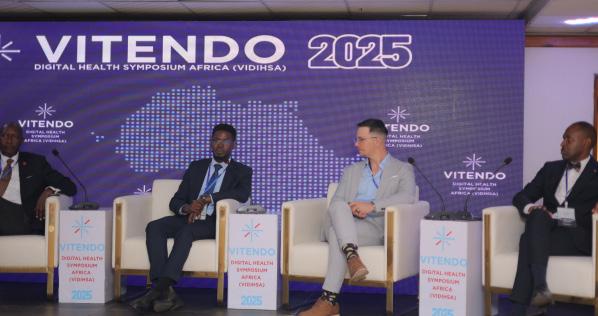




Dear CIU Family,
As we usher in a new academic year, I am honored to serve as your Guild President and excited to share our vision for the 2025/2026 term. Our leadership agenda focuses on three pillars: advancing academic excellence, ensuring effective student representation, and empowering every student. These priorities respond to the pressing needs facing university students today and reflect our commitment to CIU’s “Lead, Innovate, Transform” spirit.
We recognize that our students are the heart of this institution. Our mission is to enhance their experience by improving academic support services (including language and presentation skills), boosting access to affordable meals and housing, promoting mental health, and increasing participation in sports, innovation, and inter-university collaborations. We also aim to raise CIU’s visibility through media, introduce student-led income-generating initiatives, and strengthen feedback systems to guide decision-making. While we are proud of CIU’s recent growth—inclu -
ding its status as the top private medical teaching university in East Africa—we are also aware of the challenges we face, especially in resource allocation. Nevertheless, we will use what we have wisely and work hand in hand with the administration, faculties, and students to ensure inclusive, transparent, and accountable leadership. I invite all stakeholders to join us in building a stronger, more vibrant CIU that empowers students to lead within and beyond campus.
God bless you all. God bless CIU.

Robert Okello Guild President CIU 2025/2026

This past Easter weekend, Clarke International University (CIU) came alive with cheers, chants, and electric energy as students from all faculties united for one of the most spirited and competitive sporting events of the year—the CIU Interfaculty Football Tournament, powered by the ever-dynamic CIU Guild.
From the very first whistle, it was clear: this was no ordinary tournament. The sun-soaked weekend brought out the best of Central, Great North, Western, and International teams, each hungry for glory, unity, and bragging rights. With every kick, pass, and goal, the pitches turned into battlefields of skill, strategy, and sheer willpower.
But in the end, it was Team International who clinched the championship title in a heart-stopping finale against Team Northern. The final match had everything a football fan dreams of—tension, tactics, and a roaring crowd. Both teams locked horns in an intense deadlock, forcing the game into a nerve-racking penalty shootout.
The final whistle blew with International emerging victorious, 5–4 on penalties, igniting wild celebrations from their fans and teammates. It was a showdown worthy of a film script, full of dramatic saves, near misses, and edge-of-the-seat moments.
One of the standout stars of the entire tournament was Ochola from Team North, whose performances earned him praise across faculties. His athleticism, leadership, and sharp eye on the ball made him a fan favorite and a crucial figure in Northern’s march to the finals.
Beyond the fierce competition, what truly stood out was the sense of community, sportsmanship, and fun. The tournament wasn’t just about winning—it was about
bonding, discovering hidden talents, and celebrating the beautiful diversity that defines CIU. Students from different backgrounds, programs, and years came together not just as competitors, but as one CIU family.
A big shoutout to the CIU Guild Cabinet for organizing such a phenomenal event. From planning logistics to hyping the crowd, they ensured the tournament wasn’t just a game—it was a memory. Their efforts brought out the best of university life: energy, connection, and a celebration of student potential outside the classroom.
As the dust settles on the pitch, one thing’s for sure—CIU’s Interfaculty Games are not just a tournament; they are a tradition in the making. And if this year’s Easter showdown is anything to go by, next year’s edition will be even bigger, bolder, and better.

